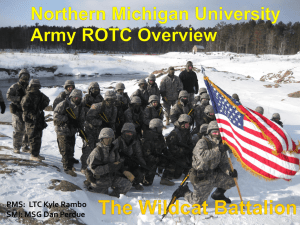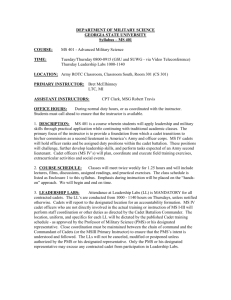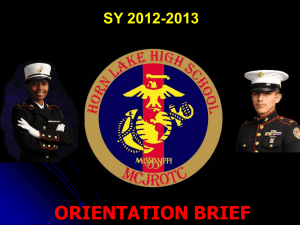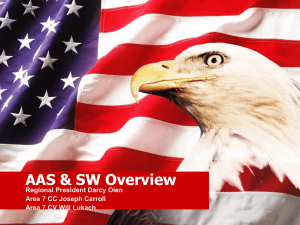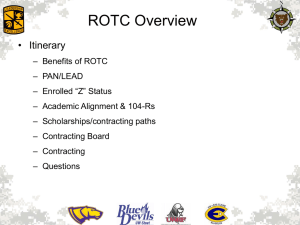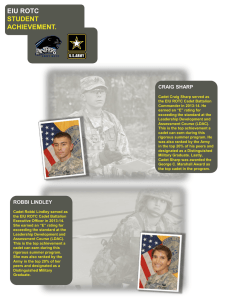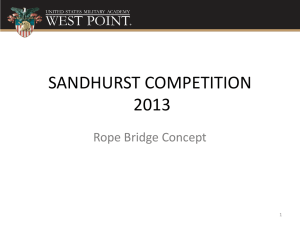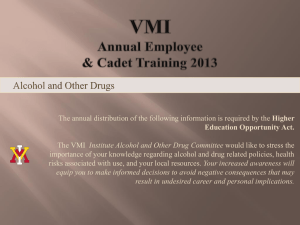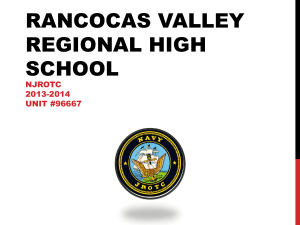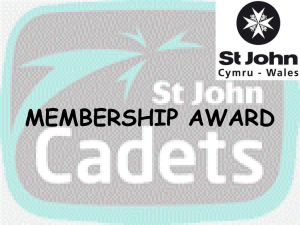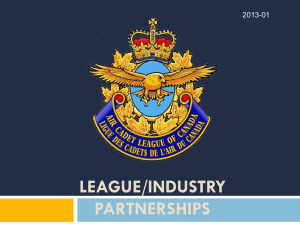Summer Training Presentation
advertisement
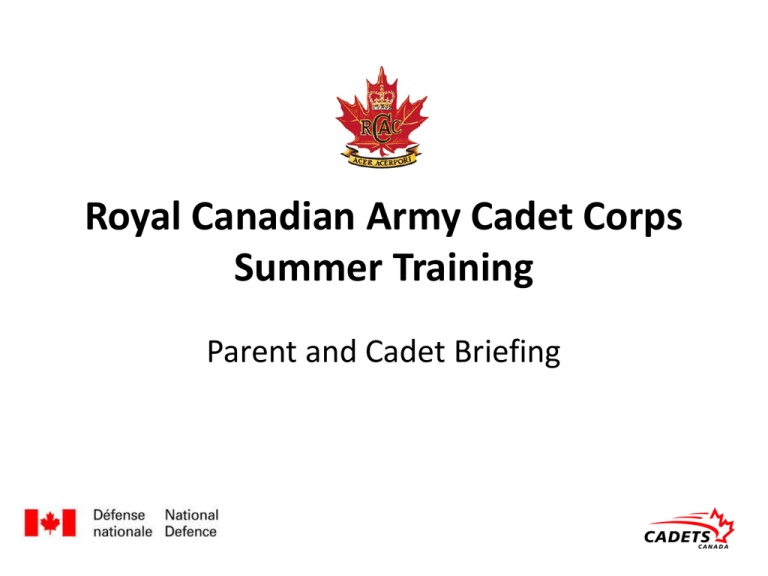
Royal Canadian Army Cadet Corps Summer Training Parent and Cadet Briefing Overview 1. Locations 2. Travel 3. Course Types and Duration 4. Training Bonus 5. Forms/Leave Permissions 6. Cadet Responsibilities 7. Corp Quotas 8. Save Questions for the end 1. LOCATIONS Army Cadet Summer Training Centres are located at: • Acadia, • Argonaut, • Blackdown, • Cold Lake, • Connaught, • Penhold, • Rocky Mountain, • Valcartier, • Vernon, • and Whitehorse 2. TRAVEL • The cadets method of travel to training will be communicated on acceptance for training. – Longer distances are by aircraft – Local travel (within the province) is usually by bus • All costs are covered in full by the DND. • All buses have Officer escorts. 3. COURSE TYPES AND DURATION • There are 4 types of courses available: These take place during July and August – General Training (2 weeks) – Green Star Cadets – Basic Training (3 weeks) – Red Star Cadets – Instructor Training (6-7 weeks) – Silver Star Cadets – Advanced Training (6-7 weeks) – Gold Star Cadets • Cadets who have completed Instructor or Advanced Training can be selected to “Staff” at the training centres (6-7 weeks). • Most courses (as time allows) have access to: swimming, camping, obstacle courses, canoeing, drill, first aid, biking, abseiling, marksmanship, music, leadership, teamwork, field craft, etc. 3a. GENERAL TRAINING • To familiarize cadets with the Army Cadet Summer Training Program and to motivate them toward pursuing further Army Cadet Training. • Must have completed the Green Star Course. • Must be recommended by their CO and approved by RCSU. 3b. BASIC TRAINING • Prepare cadets to perform the role of a peer leader while building upon the leadership, drill, ceremonial knowledge and skills learned through the Corps Program. • Must have completed the Red Star Course. • Must be recommended by their CO and approved by RCSU. 3b. BASIC TRAINING • Courses offered for Basic Training are: – Basic Marksman, – Basic Musician (Military or Pipe Band), – Basic Leadership – Basic Expedition – Basic Fitness and Sports 3c. INSTRUCTOR TRAINING • Based on the training resulting from these courses, the cadet will achieve Instructor qualification. • Further develop related specialist skills and knowledge that will allow them to perform the duties of a specialist instructor and team leader for activities. • Must have completed the Silver Star Course. • Must be recommended by their CO and approved by RCSU. 3c. INSTRUCTOR TRAINING • Courses offered for Instructor Training are: – Air Rifle Marksmanship Instructor – Marksmanship Full-bore Phase 1 – Intermediate Musician (Military or Pipe Band) – Expedition Instructor – Drill and Ceremonial Instructor – Fitness and Sports Instructor 3d. ADVANCED TRAINING • Based on the training resulting from these courses, the cadet will achieve Advanced qualification. • Further develop related advanced skills and knowledge that will allow them to perform the duties of Staff Instructors. • Preference will be given to cadets who have completed National Star Certification or NSE. • NSCE/Gold Star is now the minimum qualification to be considered for advanced training vice NSCE/NSE IAW CATO 4205. • Must be recommended by their CO and approved by RCSU. 3d. ADVANCED TRAINING • Courses offered for Instructor Training are: – Marksmanship Full-bore Phase 2 – Advanced Musician (Military or Pipe Band) – Leadership and Challenge – Staff Cadet – Basic Parachutist 3e. ADVANCED TRAINING • Clarification for Full-Bore Courses: – Cadets can be recommended by their CO (competed at zones and done the two week basic camp) or they can qualify to try out for the Full-Bore program by doing well on the three week Basic Marksman. – 100 cadets across Canada are selected from there to attend Full-Bore Phase 1. – The top 50 are then identified and of those, 36 return for Full-Bore Phase 2. – Of those 36, 18 are selected for the Bisley team (NRT) the following year. – There is an extra step in the process for this stream. Both Full-Bore Phase 2 and NRT are 8 weeks long as they shoot the DCRA TR competitions both years. – Cadets don’t receive training bonus for the extra 2 weeks though, but they do get to shoot DCRA which would cost them a few thousand dollars if they had to do it on their own. 3f. ADVANCED TRAINING • Clarification for Para Courses: – For the Para Courses they have to do the Pre-Para Course during spring break. • Clarification for Staff Courses: – Cadets participating in the Master Cadet training level must complete the Master Cadet Workshops in order to qualify, or have completed NSCE, for senior positions – Cadets must at a minimum complete the Gold Star training year to be considered for a Staff Cadet position, or have done Staff the summer before. 3g. ADVANCED TRAINING • International Exchanges: – Outward bound Wales – Outward bound Scotland – Maple Leaf Exchange (UK) – Korean Exchange – Australian Exchange – Others are added depending on funding. 4. TRAINING BONUS • All cadets undergoing training are entitled to receive a training bonus of $60 per week. • Instructors and Staff can receive higher amounts. • Training centres have in-house banking available where cadets can safely bank and withdraw funds. • On course completion, the balance of funds is issued to the cadet by cheque. 5. FORMS/LEAVE PERMISSIONS • Applications for Summer training are available to the Corps. • Applications must be generated online in Fortress from Nov. • No overnight or weekend leave is authorized without an “Acceptance and Consent Form” when the cadet accepts the offer of training. • Training is often conducted 7 days a week. • Leave is only approved if training permits. • Parents or guardians should check in advance to ensure that a cadet is available for a visit or time away from training. 6. CADET RESPONSIBILITIES Cadets should; • Report with the items as specified by the kit list. • Ensure that they do not bring any contraband. • Ensure pills or medicines are managed by the medical staff. • Report personal concerns or illness in a timely fashion to staff. • Maintain personal hygiene and regular personal tasks such as laundry, ironing, bed space etc. • Follow all rules and regulations at the training centre. • Stay safe and have FUN! 7. CORP QUOTAS • Each Corp definitely has quotas assigned. • The CO and staff create a priority list and it is based on training Attendance and Participation. • The Admin Officer manages the applications. • Final decisions to accept cadets on courses are made by RCSU, not the Corp. • Unfortunately, NOT everyone who applies is accepted. • This presentation will be available in PDF on the corps website: www.2784ggfg.com • If you have further questions, please speak to a staff member on a regular training night
